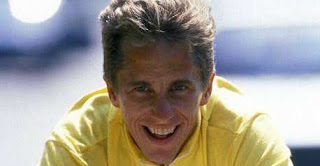LeMond upbeat about cycling's future
A Tour de France filled with negative news isn't even a month removed, and one of America's greatest cyclists, and one of its most outspoken, says he is "the most optimistic I have been in years" about the sport. Greg LeMond, the first American to win the Tour de France, was back Friday near the scene of the Boulder-based Coors Classic, which he called his "favorite race," even over the Tour. LeMond is in Longmont for the Tour de Cure, a charity ride for the American Diabetes Association that will happen today.
His has been a highly sought-after voice in the wake of this year's Tour, which ended in a victory for Spain's Alberto Contador only after whole teams dropped out and the race leader was booted in the middle of the race. LeMond has never been shy to speak about controversy in the sport, and he talked at length Friday about what can be done to help the sport he said he has always loved.
"I think we're fleshing out a lot of people who are leaving," he said. "I think a lot of people are leaving not because they can't get sponsors, but because (investigators are) getting serious. The guys that have been getting away with it don't want to be caught."
LeMond spoke Friday night about changes in the international doping system, including criminalizing offenses and taking testing away from governing bodies, and also about the bright future of Boulder's Taylor Phinney. LeMond has routinely spoken about doping, and even questioned the doping innocence of seven-time Tour winner Lance Armstrong in the past. When he returned to France this year and spoke with Tour director Christian Prudhomme, he suggested drastic changes in the way the sport is policed, and sticks by those suggestions.
"I was asked what I thought could be done, and the first thing I said was to divorce yourself from the (International Cycling Union)," LeMond said. "They're in a war in a fight over TV rights. The UCI has been negligent in the sense that they've known what's been going on in cycling. But they have done a much better job under (UCI head) Pat McQuaid, no doubt."
Other changes he suggested were to sequester riders two hours before race so there is no unsupervised access to the riders, randomly testing 20 riders every day and lowering allowable hematocrit levels from 50 percent to 46 percent, which would eliminate the ability to use EPO undetected. LeMond acknowledged the difficulty of testing for blood transfusions, which are undetectable. But he did suggest to eliminate all injections - even vitamin injections - unless they are administered by a race doctor.
They may seem like drastic changes, but the sport has reached a point where drastic measures are likely needed after the cheating improved testing has revealed.
"How is it that one team can perform and never have a positive, and then all these riders go to different teams, and they're all busted?" said LeMond, who won three yellow jerseys. "So within the athletes, there's kind of this, 'What's going on,' and it forces them to kind of try to keep up."
The biggest change would be to criminalize doping in cycling, which has proven difficult. But, he says, by increasing the penalty for cheating, those trying to root out cheaters would have much more leverage.
"There would be the ability to plea-bargain prison sentences, so when riders get busted they can rat out the system and come back to racing in much heavier testing," he said. "It needs to be criminalized because they are trafficking in illegal drugs. They are prescription drugs, but they are being illegally distributed throughout the peloton. You make sure it's very transparent, and then that increases the credibility of the sport."
Because of his status as one of America's best, LeMond will likely always be asked to evaluate this country's cycling. With high-profile doping cases involving Boulder's Tyler Hamilton, disputed Tour de France winner Floyd Landis and the cloud of suspicion over Armstrong, some have questioned whether the sport can recover in the U.S. It doesn't help, LeMond said, that cyclists like Greg Strock said in 2000 that the U.S. cycling federation injected him with illegal doping substances when he was a junior racer in 1990.
"Our federation is not the greatest example. So basically I don't trust our cycling federation," he said. "And even if we do have education, no matter what, athletes are competitive, and they need to know that if it's really being caught, they don't have to (dope)."
LeMond does see hope in Boulder's Taylor Phinney, the son of one of LeMond's greatest contemporaries, Davis Phinney, and gold medal cyclist Connie Carpenter. The younger Phinney recently won the junior men's world time trial and appears to be poised for a stellar career.
"He could be one of our most talented riders coming up. At first I thought, 'Oh, I'm so happy for him,'" said LeMond, who won the Coors Classic in 1981 and 1985 . "And then I thought, 'Oh, I'm so sad for him.' Because I don't know if I was the parent, and my son would have won the worlds, that I would allow him to pursue it on the professional level. I am optimistic that there is a change and it's shifting, and that maybe Taylor Phinney can have a chance like I did where you don't have to decide to either sell your soul to be part of a sport or having your dignity and be proud of doing it on your own."
LeMond will ride today in the Tour de Cure, and was hoping to do the century ride to Estes Park. The rides begin at 6 a.m. at the Boulder County Fairgrounds, and riders can register today. There will also be a festival at the fairgrounds during the rides.


































